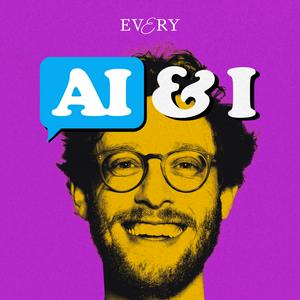How to Predict the Future With Kevin Kelly - Ep. 57
Kevin Kelly has spent more time thinking about the future than almost anyone else.From VR in the 1980s to the blockchain in the 2000s—and now generative AI—Kevin has spent a lifetime journeying to the frontiers of technology, only to return with rich stories about what’s next.Today, as Wired's senior maverick, his project for 2025 is to outline what the next century looks like in a world shaped by new technologies like AI and genetic engineering. He’s a personal hero of mine—not to mention a fellow Annie Dillard fan—and it was a privilege to have him on the show. We get into:How you can predict the future. According to Kevin, the draw of new frontiers—from the first edition of Burning Man and remote corners of Asia, to the early days of the internet and AI—isn’t staying at the edge forever; it's returning with a story to tell.Why history is so important to help you understand the future To stay grounded while exploring what’s new, Kevin balances the thrill of the future with the wisdom of the past. He pairs AI research with reading about history, and playing with an AI tool by retreating to his workshop to make something with his hands.From 1,000 true fans to an audience of one. Rather than creating for an audience, Kevin has been using LLMs to explore his own imagination. After realizing that da Vinci, Martin Luther, and Columbus were alive at the same time, he asked ChatGPT to imagine them snowed in at a hotel together, and the prompt spiraled into an epic saga, co-written with AI. But he has no plans to publish it because the joy was in creating something just for himself.What the history of electricity can teach us about AI. Kevin draws a parallel between AI and the early days of electricity. We could produce electric sparks long before we understood the forces that created them, and now we’re building intelligent machines without really understanding what intelligence is.Why Kevin sees intelligence as a mosaic—not a monolith. Kevin believes intelligence isn’t a single force, but a compound of many cognitive elements. He draws from Marvin Minsky’s “society of mind”—the theory that the mind is made up of smaller agents working together—and sees echoes of this in the Mixture of Experts architecture used in some models today.Your competitive advantage is being yourself. Don’t aim to be the best—aim to be the only. Kevin realized the stories no one else at Wired wanted to write were often the ones he was suited for, and trusting that instinct led to some of his best work.This is a must-watch for anyone who wants to make sense of AI through the lens of history, learn how to spot the future before it arrives, or grew up reading Wired.If you found this episode interesting, please like, subscribe, comment, and share! To hear more from Dan:Subscribe to Every: https://every.to/subscribe Follow him on X: https://twitter.com/danshipper SponsorsVanta: Get $1,000 off of Vanta at https://www.vanta.com/every and automate up to 90% of the work for SOC 2, ISO 27001, and more.Attio: Go to https://www.attio.com/every and get 15% off your first year on your AI-powered CRM.Timestamps:Introduction: 00:00:50Why Kevin and I love Annie Dillard: 00:01:10Learn how to predict the future like Kevin: 00:12:50What the history of electricity can teach us about AI: 00:16:08How Kevin thinks about the nature of intelligence: 00:20:11Kevin’s advice on discovering your competitive advantage: 00:27:21The story of how Kevin assembled a bench of star writers for Wired: 00:31:07How Kevin used ChatGPT to co-create a book: 00:36:17Using AI as a mirror for your mind: 00:40:45What Kevin learned from betting on VR in the 1980s: 00:45:16Links to resources mentioned:Kevin Kelly: @kevin2kellyKelly’s books: https://kk.org/books Annie Dillard books that Kelly and Dan discuss: Pilgrim at Tinker Creek, Teaching a Stone to Talk, Holy the Firm, The Writing LifeDillard’s account of the total eclipse: "Total Eclipse"
